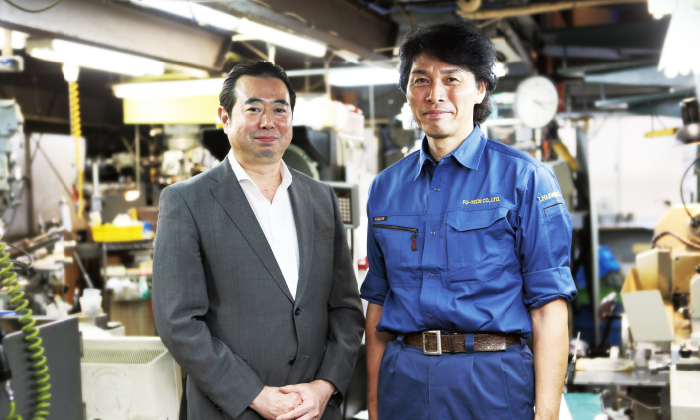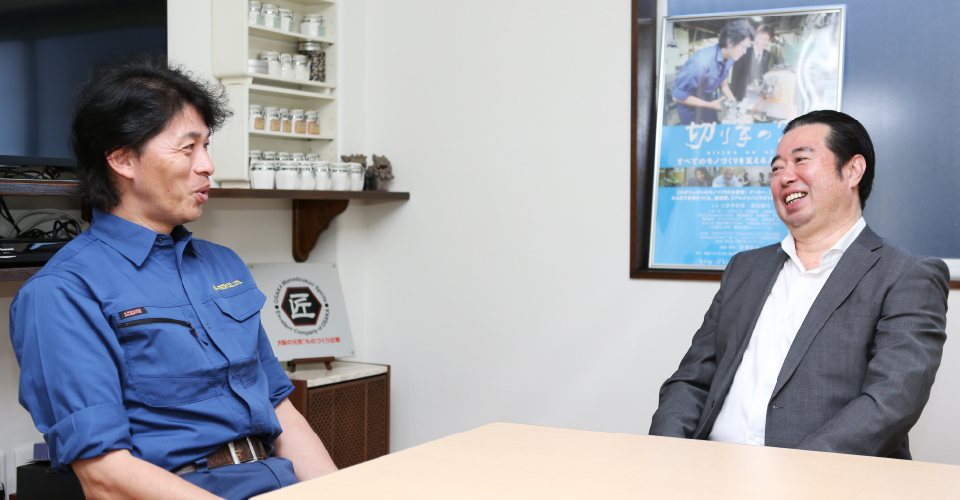
Nurturing monozukuri and people able to do monozukuri.
Mr. Takio Fujiwara, Representative Director, Fu-tech Co., Ltd.
Hiroji Goto, President and Representative Director, NS TOOL Co., Ltd.
Fu-tech Co., Ltd.
Professionals at machining delicate metal parts, possessing world-class technology. With “technology with a human touch that surpasses the limitations of equipment and tools” as their motto, they handle orders difficult for competitors?such as difficult shapes and cemented carbide?using technology created with human hands and answering with micron-scale precision. They support the cutting edge of monozukuri, involved in components such as base metals for diamond tools, precision jigs, and inspection devices for the H-IIA rockets. Representative Director Takio Fujiwara made appearances as a parts machining expert on NHK General TV’s “Incredible Techniques! Showdown! Lathes vs. Metal Spinning ~Battle of Extreme Precision~” (Episode 1 was broadcasted on Sat. July 18 and Sat. August 1, 2015, titled “SUGOWAZA” in Japanese.) and a movie called “Kiriko no Uta.”
http://www.fu-tech.jpOctober 5, 2017
Dreaming of making rocket parts as a kid.
Goto: Mr. Fujiwara, I believe you’ve responded to all sorts of difficult orders, but which job left the biggest impression on you?
Fujiwara: When I was in my mid-20s, I worked on creating the “ultrasonic weld flaw detection device” for the booster rocket?the cause of failure of the H-IIA F6 Launch Vehicle?of H-IIA F7. It was a request to manufacture a jig for an arm for sensor installation, but they told us they would entrust the method and design to us. When the rocket was launched and I saw the video of the booster tank separating in space, I felt deeply grateful for the chance to work on that job. Most everything else was really exhausting, though. (laughs)
Goto: That sounds like a job worth doing. But failure is absolutely not be permitted.
Fujiwara: When I was a kid, I wanted to either be a surgeon like Black Jack, or be a maker of rocket parts.
Goto: You got your dream fairly soon. But you mentioned that most everything else was quite exhausting?
Fujiwara: Because of it is the operation of a small factory. There was a period of time when we’d show up unannounced with a prototype, saying “we can make this.” My father passed the company down to me, and I thought I should to destroy the image of a craftsman.
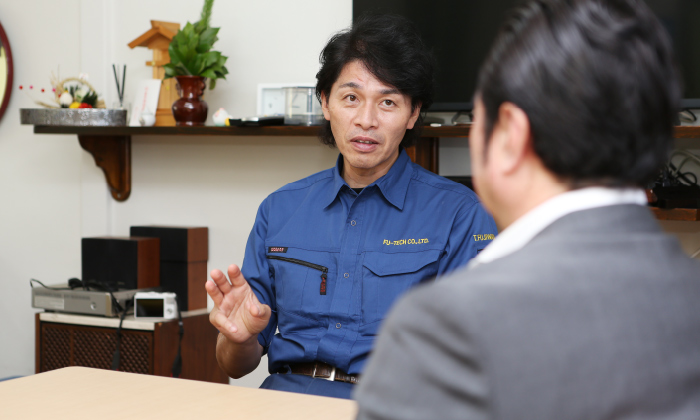
Don’t be satisfied with being a “craftsman” who only has technique.
Goto: I saw NHK’s “Incredible Techniques!” Titanium?a difficult material?was cut beautifully within the time constraints. Your opponents, the “metal spinners,” were also impressive, but I thought the techniques you used exemplified those of a monozukuri craftsman.
Fujiwara: Thank you very much. But frankly, I dislike the trend of calling people “craftsmen” just because they’re experienced. I don’t think we should give “workers” who don’t earn, teach, or learn a cool new job title. The work we do is earning money and a living. We don’t just create things; we “create” people and ways to live. I think Japanese small factories should strive in that direction too.
Goto: I see, so that’s what you meant. It’s as you say?simply creating things for your own enjoyment won’t generate value.
Fujiwara: The things we make are ordinary things that others can make too. But we think of ways to do it faster, and implement them. We look at the diagrams, imagine the completed product in our heads, then think of how to secure the materials?and how to cut them. We envision everything in our mind, then create it all in one go. Even if it’s a one-off job, we make it properly. And very quickly. It’s that kind of monozukuri that is needed from us?craftsmen who can think and take action. I think getting that value recognized is vital.
Goto: So it’s not about “making,” but “answering.” And turning your hard work into money is definitely a critical thing.
Fujiwara: If I were to categorize people involved in monozukuri, I think they advance from “worker,” to “technician,” to “craftsman,” to “professional,” to “leader.”
Goto: There’s a huge difference between just manufacturing things, and start creating something from nothing.
Fujiwara: Craftsmen can’t survive; one must be a professional. You can’t be an actor on the stage; you must be a director. That’s why I want to nurture people who can lead.
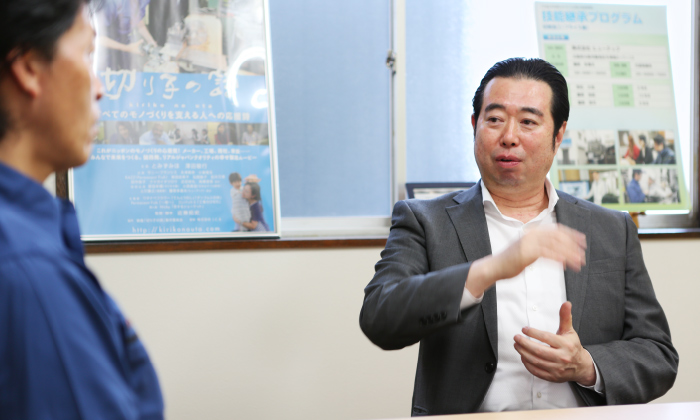
Wanting to give young people a chance to grow.
Fujiwara: I think it might become clear within the next 20 years, but I want to see where Japanese monozukuri can headed. Will people and machines coexist, or will people be out of the picture…
Goto: You’ve visited our Sendai Factory; generally we are moving towards complete automation on the manufacturing line. Your company, Fu-tech, and my company may both do monozukuri yet be total opposites. After all, what my company emphasizes is the pursuit of identical high quality.
Fujiwara: Indeed, our companies may be different as night and day. Unlike yours, mine can’t make the same item over and over again. (laughs)
Goto: But it does not mean that people will become unneeded; they’re taking on more important roles, like designing the machines for manufacturing. I think that work becomes more enjoyable for employees when they can rise to a “scriptwriting” or “directing” position.
Fujiwara: I want to give young people a chance to change like that. At the beginning, it may take all their effort just to learn the job, but I want to enable them to put their feelings into words.
Goto: After all, putting something into words means analyzing the situation and organizing thoughts. It’s very important with regards to “answering.”
Fujiwara: We should match our frequency to pick up the “radio waves” of information young people instinctively put out, have a conversation with them, and let them have words to express themselves. Leaders especially must have plenty of words. Using these words we’ve gathered, I hope to nurture the next generation of leaders.
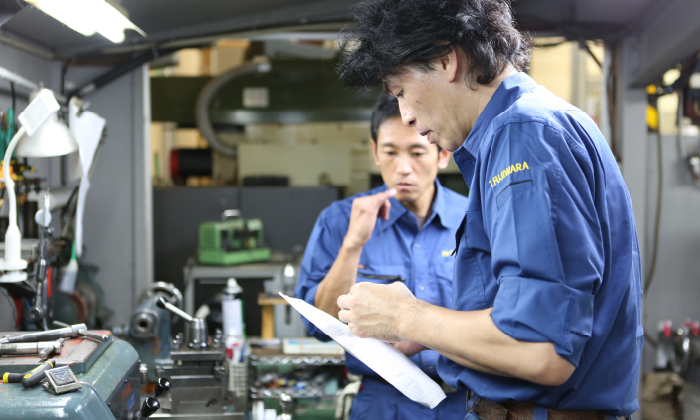
Monozukuri means nurturing leaders with strong humanity.
Goto: By Listening to you, it seems you’re saying that monozukuri is hitozukuri (“creating” people rather than things).
Fujiwara: One often hears the phrase “monozukuri is hitozukuri,” but it doesn’t feel right to me so I don’t use it. The three only S’s for me are just shitsuke (discipline), shitsuke, shitsuke. (laughs)
Goto: The ones who are able to create exceptional things are those who have an exceptional sense for people, and education is highly critical for that reason too. How exceptional will the employees we nurture’s humanity be? That is our responsibility as well.
Fujiwara: Without being someone whom people admire, whom people respect, who has strong humanity, I think no one can become a leader who oversees monozukuri. I hope NS TOOL can establish an educational system that nurtures humanity, supporting Japan’s monozukuri. I think you are one of the few business leaders who can nurture people that way.
Goto: A wide variety of things are demanded when it comes to monozukuri, like sensitivity and understanding, as well as the stance and agency for interacting with things. That’s something people should be ready with?something also important as a person. If I can be helpful in my way, it’ll certainly be something to be proud of.
Fujiwara: I think the most necessary thing in this world for utilizing blades, and for utilizing machines, is humility. When machining doesn’t go well, it’s common to think in an easygoing way, or to force things through the way you want. Without humbly taking in the situation?“because this happened, that happened”?and without humbly accepting and analyzing it, you can’t move forward. It’s about image not just the product’s final touches, but even what’s under the leftover shavings.
* Shavings mean the ones left after cutting metal with a lathe, etc.
Goto: So if the “expression” of the shavings is honest, then things are going well. When it comes to taking something head-on, perhaps it’s the same whether dealing with people or objects.
Fujiwara: In that sense, one can’t allow young people to use NS TOOL’s end mills.
Goto: Hm? Why would that be?
Fujiwara: For example, if you let a normal person drive a Formula One car, they’re not going to drive it well. It’s the same thing. Delicate, high precision tools can’t be used without the corresponding skills. Also it’ll be a problem if someone thinks they’ve gotten good when they haven’t. They’re the kind of tools whose blades will break if you push a little too hard, so people need to understand what they don’t get while they’re still green.
Goto: It is a pleasant and complex feeling for me.(laughs)
I learned a lot from today’s conversation with you. I hope we’ll do it again sometime.
